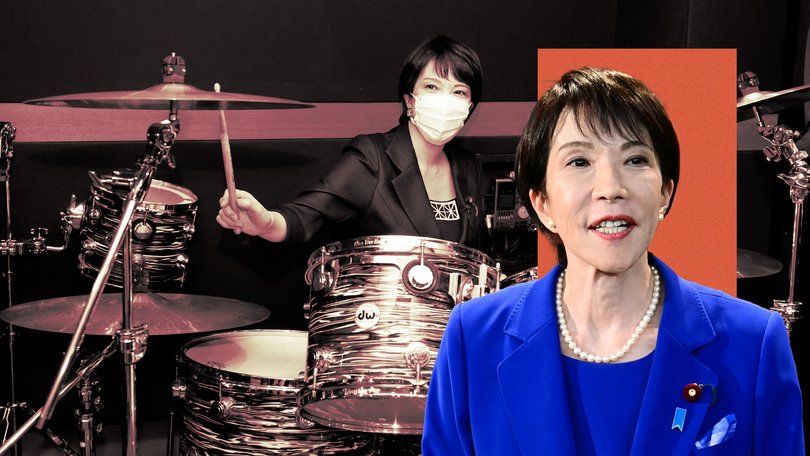AARON PATRICK: Japan’s new PM, Sanae Takaichi, nailed her first challenge. The rest of the job will be harder
AARON PATRICK: A mix of Donald Trump, Emmanuel Macron and Tony Abbott, Sanae Takaichi faces a daunting task to turn around a country in demographic decline.

In a high-stakes diplomatic debut on Tuesday, new Japanese new prime minister Sanae Takaichi demonstrated that she has learnt how to manage the often-unpredictable president of the United States, Donald Trump.
Fixing her own country is going to be a lot harder.
On Tuesday the first woman to lead the staunchly patriarchal society flattered Mr Trump in at the ornate Akasaka Palace in central Tokyo.
Sign up to The Nightly's newsletters.
Get the first look at the digital newspaper, curated daily stories and breaking headlines delivered to your inbox.
By continuing you agree to our Terms and Privacy Policy.American officials said the Japanese leader told Mr Trump during a private discussion she planned to nominate him for the Nobel Peace Prize, an honour he appears to be openly campaigning for.
Earlier, at the start of a lunch of chicken risotto and New York strip steak, Ms Takaichi praised the president for helping negotiate a ceasefire between Israel and Hamas and a peace agreement between Thailand and Cambodia.
“Japan and the US have created the greatest alliance in the world,” she said.
In a sign the style was appreciated, Mr Trump returned the superlatives. “You’re going to do a fantastic job and we’re going to have a fantastic relationship,” he said.
A setting sun
While the successful meeting, which included a rare earths agreement, helps establish the new leader’s credibility in international circles, solving Japan’s structural problems will take a lot more than ingratiating words.
The sun is setting on the Land of the Rising Sun. After peaking at 128.5 million people in 2010, Japan’s population entered what experts say is a serious, long-term decline. Across Japan’s five large islands, abandoned houses are a common sight. In country areas, some are being slowly subsumed into vegetation, like a real-life version of a zombie apocalypse.
With a fertility rate of 1.15 children per woman, Japan faces a demographic apocalypse. By 2070 the over-65s are expected to comprise 40 per cent of the population, which will be 30 per cent smaller than today, according to a government estimate.
Western countries, such as Australia, have dealt with the same problem by importing immigrants from China, India and elsewhere. Japan’s xenophobic society, dedicated to preservation of its culture, enforces strict immigration laws to preserve racial purity.
Women at home
As a life-long nationalist, Ms Takaichi wants to increase Japan’s self reliance. Speaking to Mr Trump, she promised to increase Japanese power through a stronger defence, economy, technology, intelligence and human capital.
One way she could deliver on the latter is by liberating Japanese women, who live much more restrictive lives than their Western counterparts. Even though Japanese women are some of the most educated in the world, a persistent expectation they must manage all domestic responsibilities, including raising children and caring for elderly parents, leads many to abandon their careers after their first child.
The result is a business culture dominated by men. At Japan’s biggest 1,643 listed companies in 2023, only 13 had female CEOs, according to Tokyo Shoko Research. In one famous example of workplace sexism, the head of the Tokyo Olympics organising committee in 2021 complained women talked too much and took up too much time when “allowed into” high-level meetings.
In politics, the gender breakdown is similar. In the lower house of parliament, which selects the prime minister, 16 per cent of representatives are women. They include Ms Takaichi, who was first elected in 1993 as an independent. As a young woman she was no conformist: she played drums in a heavy metal band and rode motorcycles.
Going right
In Parliament, she became one of Japan’s prominent conservative female politicians. One of her positions was to oppose a law in 2020 that would have allowed married women to keep their maiden surnames unless their husbands changed theirs’.
On foreign affairs she went to the right too, prompting comparisons with British Prime Minister Margaret Thatcher, one of the Western heroes of the Cold War. Ms Takaichi wants Japan to increase military spending to stand up to China. She has also downplayed Japanese atrocities during World War II.
The result is a politician with the conservativism of former Australian leader Tony Abbott, the nationalism of Mr Trump and the charm of French President Emmanuel Macron.
Whether she can succeed where her predecessors have failed is one of the most interesting questions in international politics.

